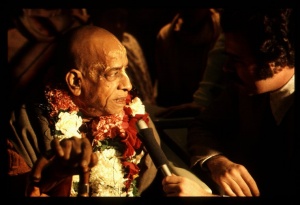SB 5.1.8: Difference between revisions
No edit summary |
(Vanibot #0054 edit - transform synonyms into clickable links, which search similar occurrences) |
||
| Line 24: | Line 24: | ||
<div class="synonyms"> | <div class="synonyms"> | ||
''saḥ'' | ''[//vanipedia.org/wiki/Special:VaniSearch?s=saḥ&tab=syno_o&ds=1 saḥ]'' — he (Lord Brahmā); ''[//vanipedia.org/wiki/Special:VaniSearch?s=tatra&tab=syno_o&ds=1 tatra] [//vanipedia.org/wiki/Special:VaniSearch?s=tatra&tab=syno_o&ds=1 tatra]'' — here and there; ''[//vanipedia.org/wiki/Special:VaniSearch?s=gagana&tab=syno_o&ds=1 gagana]-[//vanipedia.org/wiki/Special:VaniSearch?s=tale&tab=syno_o&ds=1 tale]'' — under the canopy of the sky; ''[//vanipedia.org/wiki/Special:VaniSearch?s=uḍu&tab=syno_o&ds=1 uḍu]-[//vanipedia.org/wiki/Special:VaniSearch?s=patiḥ&tab=syno_o&ds=1 patiḥ]'' — the moon; ''[//vanipedia.org/wiki/Special:VaniSearch?s=iva&tab=syno_o&ds=1 iva]'' — like; ''[//vanipedia.org/wiki/Special:VaniSearch?s=vimāna&tab=syno_o&ds=1 vimāna]-[//vanipedia.org/wiki/Special:VaniSearch?s=āvalibhiḥ&tab=syno_o&ds=1 āvalibhiḥ]'' — in their different airplanes; ''[//vanipedia.org/wiki/Special:VaniSearch?s=anupatham&tab=syno_o&ds=1 anupatham]'' — along the path; ''[//vanipedia.org/wiki/Special:VaniSearch?s=amara&tab=syno_o&ds=1 amara]'' — of the demigods; ''[//vanipedia.org/wiki/Special:VaniSearch?s=parivṛḍhaiḥ&tab=syno_o&ds=1 parivṛḍhaiḥ]'' — by the leaders; ''[//vanipedia.org/wiki/Special:VaniSearch?s=abhipūjyamānaḥ&tab=syno_o&ds=1 abhipūjyamānaḥ]'' — being worshiped; ''[//vanipedia.org/wiki/Special:VaniSearch?s=pathi&tab=syno_o&ds=1 pathi] [//vanipedia.org/wiki/Special:VaniSearch?s=pathi&tab=syno_o&ds=1 pathi]'' — on the way, one after another; ''[//vanipedia.org/wiki/Special:VaniSearch?s=ca&tab=syno_o&ds=1 ca]'' — also; ''[//vanipedia.org/wiki/Special:VaniSearch?s=varūthaśaḥ&tab=syno_o&ds=1 varūthaśaḥ]'' — in groups; ''[//vanipedia.org/wiki/Special:VaniSearch?s=siddha&tab=syno_o&ds=1 siddha]'' — by the residents of Siddhaloka; ''[//vanipedia.org/wiki/Special:VaniSearch?s=gandharva&tab=syno_o&ds=1 gandharva]'' — by the residents of Gandharvaloka; ''[//vanipedia.org/wiki/Special:VaniSearch?s=sādhya&tab=syno_o&ds=1 sādhya]'' — by the residents of Sādhyaloka; ''[//vanipedia.org/wiki/Special:VaniSearch?s=cāraṇa&tab=syno_o&ds=1 cāraṇa]'' — by the residents of Cāraṇaloka; ''[//vanipedia.org/wiki/Special:VaniSearch?s=muni&tab=syno_o&ds=1 muni]-[//vanipedia.org/wiki/Special:VaniSearch?s=gaṇaiḥ&tab=syno_o&ds=1 gaṇaiḥ]'' — and by great sages; ''[//vanipedia.org/wiki/Special:VaniSearch?s=upagīyamānaḥ&tab=syno_o&ds=1 upagīyamānaḥ]'' — being worshiped; ''[//vanipedia.org/wiki/Special:VaniSearch?s=gandha&tab=syno_o&ds=1 gandha]-[//vanipedia.org/wiki/Special:VaniSearch?s=mādana&tab=syno_o&ds=1 mādana]'' — of the planet where the Gandhamādana Hill is found; ''[//vanipedia.org/wiki/Special:VaniSearch?s=droṇīm&tab=syno_o&ds=1 droṇīm]'' — the border; ''[//vanipedia.org/wiki/Special:VaniSearch?s=avabhāsayan&tab=syno_o&ds=1 avabhāsayan]'' — illuminating; ''[//vanipedia.org/wiki/Special:VaniSearch?s=upasasarpa&tab=syno_o&ds=1 upasasarpa]'' — he approached. | ||
</div> | </div> | ||
Latest revision as of 22:02, 18 February 2024

A.C. Bhaktivedanta Swami Prabhupada
TEXT 8
- sa tatra tatra gagana-tala uḍu-patir iva
- vimānāvalibhir anupatham amara-parivṛḍhair
- abhipūjyamānaḥ pathi pathi ca varūthaśaḥ
- siddha-gandharva-sādhya-cāraṇa-muni-gaṇair
- upagīyamāno gandha-mādana-droṇīm avabhāsayann upasasarpa
SYNONYMS
saḥ — he (Lord Brahmā); tatra tatra — here and there; gagana-tale — under the canopy of the sky; uḍu-patiḥ — the moon; iva — like; vimāna-āvalibhiḥ — in their different airplanes; anupatham — along the path; amara — of the demigods; parivṛḍhaiḥ — by the leaders; abhipūjyamānaḥ — being worshiped; pathi pathi — on the way, one after another; ca — also; varūthaśaḥ — in groups; siddha — by the residents of Siddhaloka; gandharva — by the residents of Gandharvaloka; sādhya — by the residents of Sādhyaloka; cāraṇa — by the residents of Cāraṇaloka; muni-gaṇaiḥ — and by great sages; upagīyamānaḥ — being worshiped; gandha-mādana — of the planet where the Gandhamādana Hill is found; droṇīm — the border; avabhāsayan — illuminating; upasasarpa — he approached.
TRANSLATION
As Lord Brahmā descended on his carrier, the great swan, all the residents of the planets named Siddhaloka, Gandharvaloka, Sādhyaloka and Cāraṇaloka, as well as great sages and demigods flying in their different airplanes, assembled within the canopy of the sky to receive Lord Brahmā and worship him. As he received respect and adoration from the residents of the various planets, Lord Brahmā appeared just like the full moon surrounded by illuminating stars. Lord Brahmā's great swan then arrived at the border of Gandhamādana Hill and approached Prince Priyavrata, who was sitting there.
PURPORT
It appears from this description that there is regular interplanetary travel between the planets of the demigods. Another significant point is that there is a planet covered mostly by great mountains, one of which is Gandhamādana Hill. Three great personalities—Priyavrata, Nārada and Svāyambhuva Manu—were sitting on this hill. According to Brahmā-saṁhitā, each universe is filled with different planetary systems, and every system has a unique opulence. For example, on Siddhaloka, all the residents are very advanced in the powers of mystic yoga. They can fly from one planet to another without airplanes or other flying machines. Similarly, the residents of Gandharvaloka are expert in musical science, and those on Sādhyaloka are all great saints. The interplanetary system undoubtedly exists, and residents of different planets may go from one to another. On this earth, however, we have not invented any machine that can go directly from one planet to another, although an unsuccessful attempt has been made to go directly to the moon.